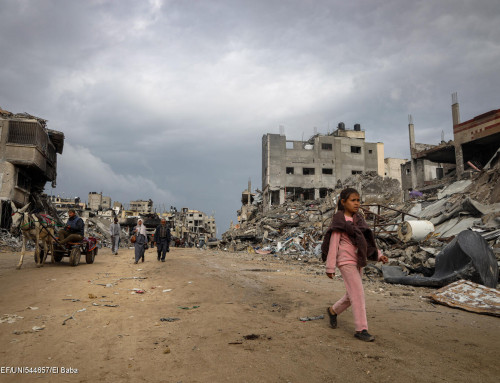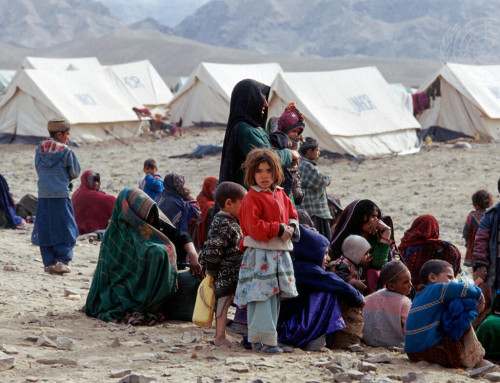The number of grave violations against children significantly decreased in Iraq between August 2019 and June 2021 from 2,114 in the previous report to 317, possibly attributed to the progress made in countering Da’esh (ISIL). This was highlighted in the fourth report of the Secretary-General on Children and Armed Conflict in Iraq. The vast majority of all grave violations were verified in areas previously under Da’esh control and most violations were attributed to Da’esh (65) when perpetrators of grave violations could be identified.
The killing and maiming of children remained the most verified violation during the reporting period, with 249 children affected. While this number remains high, it represents the lowest number verified in the country since the United Nations started monitoring grave violations against children in 2009. Of concern, explosive remnants of war (ERW) and improvised explosive devices (IED) represented the leading cause of child casualties. As recently as early February 2022, four children were killed and two others maimed by explosive ordnance in Baghdad and Babel provinces.
“Despite a significant decrease, incidents of killing and maiming of children continue to be disturbingly high, and it is distressing that most of these child casualties were caused by explosive remnants of war and improvised explosive devices. I call upon the Government of Iraq to continue promoting mine clearance, mine risk education, victim assistance and stockpile destruction, including prior to any movement and return of internally displaced persons back to contaminated area. The United Nations will continue to support the Iraqis in that regard,” said the Special Representative of the Secretary-General for Children and Armed Conflict, Virginia Gamba.
The denial of humanitarian access was the second most verified violation with 62 incidents, the majority related to restrictions resulting from bureaucratic impediments by authorities. The Special Representative calls on the Iraqi authorities, both at national and local levels, to coordinate amongst entities to ensure the safe and unimpeded access to humanitarians for the timely delivery of life-saving assistance, fundamental for the protection of children in need.
Detention of Children
More than a thousand children (1,091) were held in detention by Iraqi security forces on national security-related charges, which represents a sharp increase and a serious protection concern.
“Children under 18 actually or allegedly associated with armed groups, including those designated as terrorist by the United Nations, such as Da’esh, should be considered and treated primarily as victims. Children held on such grounds should be released immediately and handed over to civilian actors. Their detention should only be used as a last resort and for the shortest period of time. Alternatives to detention, such as long-term and sustainable reintegration, should be actively sought, in line with the best interest of the child,” the Special Representative added. She further stresses that when children are suspected of having committed criminal acts, due process and fair trial standards must be adhered to, with appropriate consideration given to age and gender. Any prosecution of children should respect international recognized standards of juvenile justice.
While attacks on schools and hospitals were limited, the military use of 45 schools was verified, all in areas previously under Da’esh control. The Special Representative reminds that education and health care facilities should remain safe zones exempt from the presence of military assets and personnel.
Repatriation of Children and other Progress
The repatriation of foreign children from Iraq continued with a total of 627 children repatriated to their country of origin during the reporting period. Furthermore, the Government of Iraq conducted an initial repatriation of Iraqi families from Hawl camp in Syria, which included 245 children. The Special Representative welcomes the work of the Iraqi Government in that regard and calls upon all concerned countries to do the same, and immediately facilitate the voluntary repatriation of all their child nationals and provide them with specialized child-protection programs to ensure their full reintegration into society.
The passing of the Yazidi Female Survivors Law by the Government of Iraq, addressing the needs of survivors of atrocities committed by Da’esh, was also a positive step, which the Special Representative welcomes. “I commend the passing of the law and encourage the Government to continue engaging with the United Nations on its implementation, including by ensuring a survivor-centered approach and by paying particular attention to the needs of children,” she said. Incidents of sexual violence against children, both girls and boys, nevertheless continued to be underreported for fear of stigma, retaliation and lack of health, psychosocial and legal support for survivors, with no verified incident during the reporting period.
Additionally, the Special Representative welcomes the engagement of the Iraqi Government in the development of an Action Plan to strengthen the protection of children and stop and prevent recruitment and use of children by the Popular Mobilization Forces (PMF), and she urges the Government to expedite its finalization and signature. She emphasizes that the United Nations remains available to continue to support the authorities in that sense as well as on other measures to reinforce the protection of children.
###
Grave violations against children
TOTAL: 317 grave violations against 254 children
Recruitment and Use: One (1) child
Killing and maiming: 249 children (98 killed, 151 maimed)
Rape and other forms of sexual violence: none verified
Abductions: Four (4) children
Attacks on schools and hospitals: One (1) attack on a health care centre
Denial of humanitarian access: 62 incidents
###
For additional information, please contact:
Fabienne Vinet, Communications Officer, Office of the Special Representative of the Secretary-General for Children and Armed Conflict
+1-212-963-5986 (office) / +1-917-288-5791 (mobile) / vinet@un.org
Follow us on Twitter and Facebook:
https://www.instagram.com/nochildreninwar/
www.twitter.com/childreninwar
www.facebook.com/childrenandarmedconflict



